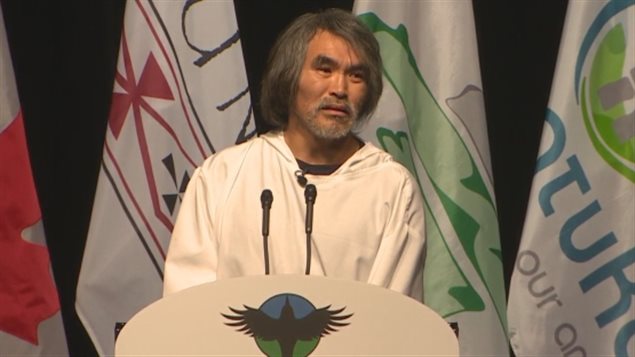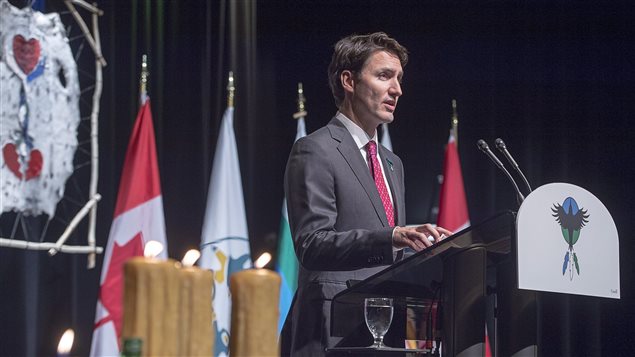Prime Minister Justin Trudeau formally apologized to former students of Newfoundland and Labrador residential schools for Canada’s “colonial ways,” acknowledging that words alone are not enough to heal the “dark and shameful chapter in our country’s history.”
Speaking before an audience of hundreds in Happy Valley-Goose Bay, Labrador Friday morning, Trudeau acknowledged that the apology was long overdue.
Between 1949 and 1979, thousands of Indigenous children were taken from their communities to attend five residential schools that were run by the Moravian Mission and the International Grenfell Association (IGA). Many Indigenous students said they were sexually and physically abused, and suffered language and cultural losses at these government-sanctioned schools.
“Today, I stand humbly before you, as Prime Minister of Canada, to offer a long overdue apology to former students of the five residential schools in Newfoundland and Labrador on behalf of the Government of Canada and all Canadians,” Trudeau said. “I also offer an apology to the families, loved ones and communities impacted by these schools for the painful and sometimes tragic legacy these schools left behind.
“For all of you – we are sincerely sorry – pijâgingilagut – apu ushtutatat.”
ListenWords alone are not enough to heal the wounds of the past, Trudeau said
“Saying that we are sorry today is not enough. It will not undo the harm that was done to you. It will not bring back the languages and traditions you lost. It will not take away the isolation and vulnerability you felt when you separated from your families, communities and cultures,” Trudeau said.
“We share this burden with you by fully accepting our responsibilities – and our failings – as a government and as a country.”
By acknowledging the past and educating themselves about the experiences of Indigenous children in these residential schools, Canadians can ensure that this history is never forgotten, Trudeau said.
‘A long time in the making’

Following Trudeau’s apology, residential school survivor Tony Obed accepted the prime minister’s words as a first step towards healing in an emotional address.
“The apology has been a long time in the making — too long,” he said.
“Because I come from a patient and forgiving culture, I think it is proper for us to accept an apology from the government of Canada.”
ListenObed became one of the driving forces behind efforts to get an official apology and compensation from the government, after the former students at five schools in the province were left out of a compensation package and national apology in 2008 by former Prime Minister Stephen Harper.
His Conservative government argued that Ottawa didn’t oversee those schools because they were created before Newfoundland joined the Canadian Confederation in 1949.
“We wanted to hear those words applied to us, we felt left out, forgotten and abandoned,” Obed said.
Nevertheless, the Liberal government offered last year to settle a class-action lawsuit for $50 million.
Innu refuse to accept the apology
However, Innu leaders in Labrador boycotted the event and did not accept the apology, saying Innu children suffered not only in the residential schools but also in the provincial child protection system which exists today.
“Our Elders are not ready to accept an apology that is made for such a small part of our experience,” Grand Chief Gregory Rich said in a statement.
“Frankly, I don’t think Canada is truly ready to make an apology to Innu if it does not include recognition of other damages done to our people – I’m not satisfied that Canada understands yet what it has done to Innu and what it is still doing.”
The statement says Innu children were also abused in Roman Catholic schools and in the homes of teachers and missionaries in the communities of Sheshatshiu and Davis Inlet. It said governments haven’t recognized that.
“The truth of what happened to the past generations of Innu has never been fully documented and we can’t deal with this in bits and pieces,” said Chief Eugene Hart of the Sheshatshiu Innu First Nation.
With files from CBC News and The Canadian Press







For reasons beyond our control, and for an undetermined period of time, our comment section is now closed. However, our social networks remain open to your contributions.